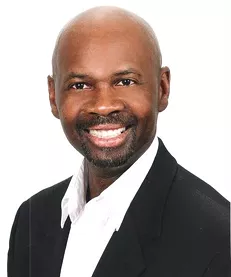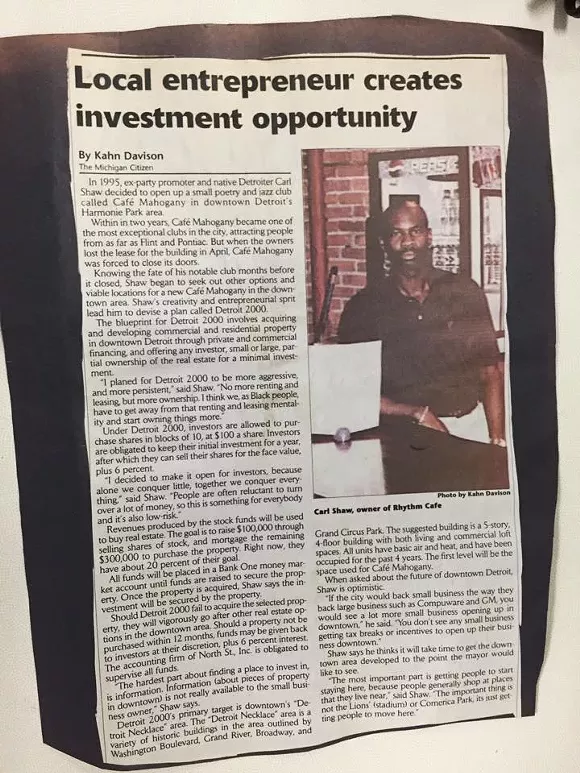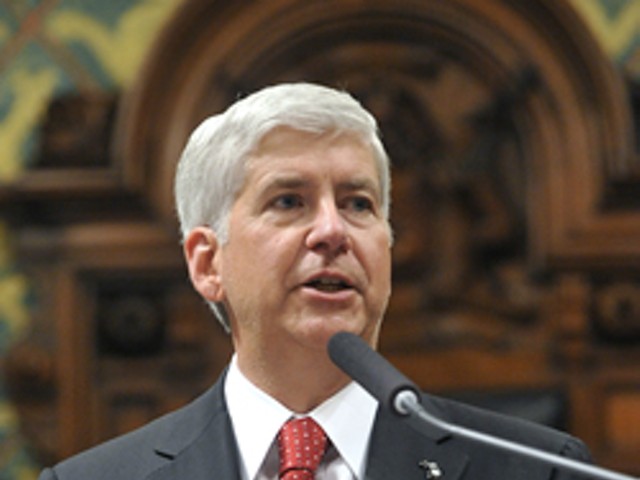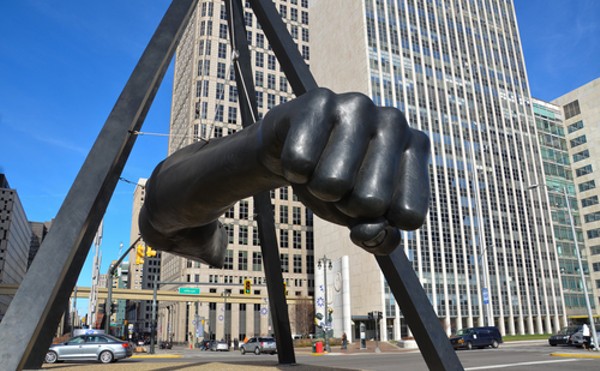In 1995, Detroit native Carl Shaw opened up the famed poetry and hip-hop spot Café Mahogany in downtown’s Harmonie Park. Within a short period of time, the café became one of the most legendary chill-out lounges in Detroit history. The hip-hop freestyle nights were classic, the house and techno nights were intoxicating, and the spoken word Tuesdays were epic. Ultimately, the café was knocked out by rising rents.
In 2000, I had the opportunity to interview Shaw as a reporter for the now-defunct Michigan Citizen (see clip below). Shaw had attempted capture the same energy and vibes by opening the Rhythm Café (which also closed shortly after it was opened), but his bigger vision involved actually buying a building instead of leasing a space. The plan, called Detroit 2000, was a grassroots campaign to have minority-owned real estate in downtown Detroit, just before Dan Gilbert’s shopping spree started.
They targeted a building in Grand Circus Park and attempted to raise $100,000 by selling shares of stock in the building, while the remaining $300,000 would be mortgaged. The building would have rented apartments as the main source of income, with a revitalized Café Mahogany housed on the ground floor.
Shaw now resides in Wisconsin, where he is employed by GE Healthcare. I caught up with him recently and he was able to shed some light and opinions on Detroit’s new economic moves and shakes.
Metro Times: Were Café Mahogany and The Rhythm Café your first business ventures in downtown Detroit? If not what were the others?
Shaw: No, I operated a marketing and promotion company whose mission was to design and run "street-level" marketing for restaurants in downtown.
MT: Ford Field broke ground in 1999 and Comerica Park opened in 2000. How did that change the financial and real-estate landscape of downtown Detroit?
Shaw: From my perspective, it radically changed the environment for real estate owners and those looking to operate within a one to two mile radius of Comerica Park. Some land owners were quick to raise rents and others attempted to capitalize on the anticipated raise in property values. Just as the stock market is driven by speculation, so was the real estate market in downtown.
Property owners eagerly anticipated a boom in outside development, and in some cases small business owners as Café Mahogany was squeezed off the market. In retrospect, we know this speculation resulted in over-promising and under-delivering, as the impact from these two developments did not have the anticipated punch of revitalization across the area.
MT: Was it harder to purchase property?
Shaw: It was harder because real estate had a jump in prices and the [comps] did not support the increases. Banks were skeptical to loan money on inflated properties and rightly so. Keep in mind we are speaking to the lower-tier investors, and not the Ilitches or other property icons.
MT: Did land prices skyrocket all at once?
Shaw: No, it was gradual.
MT: Your Detroit 2000 plan was very aggressive. It was open to investors and it was well thought out. Can you say what building you were trying to purchase?
Shaw: We had a couple of properties in the Broadway and Grand Circus Park area. We set a target and time frame to raise the seed money required and fell short of our goal. If it was like today, with the access to Internet funding such as Kickstarter, we would have reached the outcome we were after. Yet we faced the challenge that still exists today: access to capital and banks willing to work with entrepreneurs without million dollar backers. I understand too well the challenges faced in the independent market. During the five-year run of Café Mahogany, we saw at least seven businesses open and close that had major backing. The businesses that replaced us in fact lasted about 12 months before they ran aground.
MT: Can you reveal what the outcome was?
Shaw: As I recall, we raised close to $50,000 of the $125,000 we were seeking.
MT: How much support did you receive and what were the challenges?
Shaw: It's difficult to quantify the support. We had many who applauded the effort and were interested in the outcome. The challenge was finding investors interested in downtown and who were financially astute to understand the risks and rewards. Your readers may not grasp the environment and access to information that existing 20 years ago. The Internet was still new. Access to capital markets outside of your physical location was a barrier, as the venture capital was primarily brick-and-mortar in the city. The Comericas and NBD (now Chase) were very risk-adverse and not open to "young, minority investors."
MT: It seems as if there are two main narratives in Detroit.
Voice 1: The downtown improvements are long overdue. Let Dan Gilbert buy what he wants as long as he fixes it up and turns it into a viable tax base.
Voice 2: Detroit is going through gentrification and the whites and upper middle class are taking back Detroit. The actual “neighborhoods” stay untouched, while all the money is going to improve downtown.
What’s your perspective?
Shaw: As you state, it is great, and the renaissance of the city is long overdue. It clearly takes money to make money, and you need someone or some people to have the money and vision to revitalize an area or city. Downtown Detroit has been a sleeping gem for at least my lifetime, with beautifully designed buildings just waiting for someone to take the cloth and polish them. The pizza baron invested with Fox and Tigers, and now Dan Gilbert is moving this forward. What the city needs to be mindful of is ensuring the lower-tier investors are not totally excluded from "New Detroit." The gentrification problem is not only a Detroit phenomenon; Harlem and New Orleans are two that come to mind facing the same problem. [The question is] how to sustain development, encourage outside investment, and encourage entrepreneurship from all levels.
MT: What do you think the future holds for Detroit, and do you have any current investments in Detroit?
Shaw: Detroit appears to be heading in the right direction. The business climate downtown is strong, the automotive industry is on solid footing and competing globally, the emotional burden of political corruption is waning and one of the most important measurements is the youth are excited about Detroit. The people are the life blood, the essence of what makes a city vibrate and today more than ever the young from across the region are investigating the city, they can feel the momentum and want to be a part of the change. To ensure success, the leadership in the city and the state most make strides to insure that the neighborhoods beyond downtown experience financial support just as downtown has. They must place safeguards to see everyone has a share of the pie.
'New Detroit' needs lower-tier investors, says entrepreneur Carl Shaw
[
{
"name": "GPT - Leaderboard - Inline - Content",
"component": "35519556",
"insertPoint": "5th",
"startingPoint": "3",
"requiredCountToDisplay": "3",
"maxInsertions": 100
}
]








